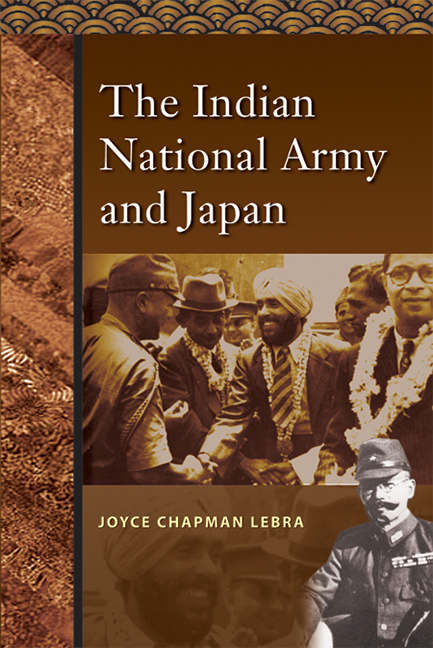Book contents
- Frontmatter
- Contents
- Illustrations and Maps
- Abstract
- Foreword
- Preface
- Acknowledgements
- Introduction
- 1 Mission to Bangkok
- 2 Malayan Jungle Meeting
- 3 Singapore Capitulates and the INA Blossoms
- 4 Tokyo Conference
- 5 Japanese Policy toward India
- 6 The Crisis of the First INA
- 7 Subhas Chandra Bose, Hitler, and Tōjō
- 8 Bose, the FIPG, and the Hikari Kikan
- 9 To India or Not?
- 10 The Rising Sun Unfurls; the Tiger Springs
- 11 A Plane Crash
- 12 A Trial in the Red Fort
- 13 Retrospect
- Notes
- Bibliographical Note
- Bibliography
- Index
- About the Author
12 - A Trial in the Red Fort
Published online by Cambridge University Press: 21 October 2015
- Frontmatter
- Contents
- Illustrations and Maps
- Abstract
- Foreword
- Preface
- Acknowledgements
- Introduction
- 1 Mission to Bangkok
- 2 Malayan Jungle Meeting
- 3 Singapore Capitulates and the INA Blossoms
- 4 Tokyo Conference
- 5 Japanese Policy toward India
- 6 The Crisis of the First INA
- 7 Subhas Chandra Bose, Hitler, and Tōjō
- 8 Bose, the FIPG, and the Hikari Kikan
- 9 To India or Not?
- 10 The Rising Sun Unfurls; the Tiger Springs
- 11 A Plane Crash
- 12 A Trial in the Red Fort
- 13 Retrospect
- Notes
- Bibliographical Note
- Bibliography
- Index
- About the Author
Summary
THE VICTORS DISPOSE
After the war INA officers and men in Southeast Asia were repatriated to India. An organization called the British Combined Services Detailed Interrogation Centre interrogated the returned prisoners in the Red Fort. The fort had an illustrious history. It had been the seat of Mogul rule and the focal point of fighting toward the end of the Indian Mutiny in 1857. It became during the war the goal of Netaji and the independence movement. Now a new drama unfolded there as thousands of Indian freedom fighters arrived as prisoners. Fifteen hundred had been captured at Imphal. In September seven thousand surrendered in Malaya and Bangkok. Over ten thousand INA soldiers were returned from Rangoon between May and October 1945. Not until March 1946 were all repatriated.
Thousands were interrogated within the walls of the historical Red Fort. Some were simply returned to their regiments. Others were sent to “rehabilitation centres” before being returned to the Army. Still others were held in custody, adjudged too “indoctrinated” to be safe within the Army again.
On all sides arose popular support for the returned heroes. Sympathy for the patriots spread to the Army and Navy. Nehru spoke of the men on 20 August:
Now a very large number of officers and soldiers of the I.N.A. … are prisoners and some of them at least have been executed. At any time it would have been wrong to treat them too harshly, but at this time—when it is said big changes are impending in India, it would be a very grave mistake leading to far-reaching consequences if they were treated just as ordinary rebels. The punishment given them would in effect be a punishment on all India and all ndians, and a deep wound would be created in millions of hearts.
Nehru's attitude was remarkable in view of his former antagonism to Bose and his 1942 declaration that he would resist any armed invasion of India which Bose might lead for the liberation of India. News of Netaj's death, reaching India at this time, further enhanced popular sympathy for the INA. The British had cause for concern.
The problem for the British was what to do with all these men. From the standpoint of the British every man in the INA was guilty of treason, an offence legally punishable by death.
- Type
- Chapter
- Information
- The Indian National Army and Japan , pp. 200 - 209Publisher: ISEAS–Yusof Ishak InstitutePrint publication year: 2008

